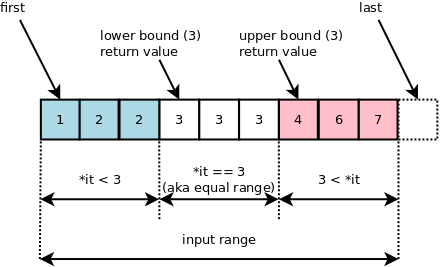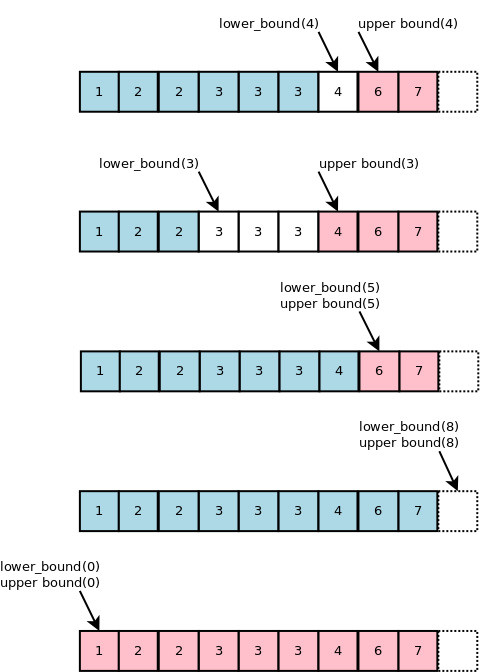Lower bound basics
Efficient find in a sorted range
Introduction
We’re going to have a look at a function similar to std::lower_bound from
the standard C++ library with some differences.
The name lower_bound is easier to understand if we look at equal_range and
upper_bound as well.
equal_range returns two iterators that define the range of a value in a
sorted range (assuming a value can appear multiple times). lower_bound is
just the first iterator, i.e. the beginning of the equal value range.
upper_bound is the second iterator, i.e. the end of the equal value range, in
a ‘one past the last’ sense.

See the article on min as to why we care.
A possible implementation looks like:
1
2
3
4
5
6
7
8
9
10
11
12
13
14
15
16
17
18
19
20
21
22
23
24
25
26
27
28
29
namespace algs {
namespace impl {
template<typename T, typename Cmp>
struct lower_bound_predicate {
const T & value_;
Cmp cmp_;
lower_bound_predicate(const T & value, Cmp cmp)
: value_{ value }, cmp_{ cmp } {
}
bool operator()(const T & at_it) {
return !cmp_(at_it, value_);
}
};
}
// generalized lower_bound point taking comparison and projection
template<typename I, typename S, typename T, typename Cmp, typename Proj>
// requires I is an ForwardIterator,
// S is a setinel for I
// Cmp is a strict weak ordering on projection Proj of ValueType(I) and T
I lower_bound(I f, S l, const T & value, Cmp cmp, Proj proj) {
algs::impl::lower_bound_predicate<T, Cmp> pred{ value, cmp };
return partition_point(f, l, pred, proj);
}
// ... less general options implemented in terms of the above
}
The rest of the article is about how did we get there.
Basic usage
Basic usage of lower_bound looks like this:
1
2
3
4
5
std::vector<char> v{ 1, 2, 2, 3, 3, 3, 4, 6, 7 };
auto it = algs::range::lower_bound(v, 3);
if ((it == v.end()) || (*it != 3)) {
std::cout << "FAIL!\n";
}
How it works
This implementation is basically an application of
std::partition_point, with a suitably defined predicate:
lower_bound_predicate.
lower_bound_predicate is chosen such that *it < value is false.
The constructor or lower_bound_predicate captures the value and comparison to
use. One tiny unusual fact is that the value is captured in a const &
member, so we need to ensure that the scope of value is larger than the scope
of the lower_bound_predicate instance.
Below are example return values for various scenarios.

Algorithmic complexity
Is the same as for partition_point: O(lg(n)) (except for
ForwardIterator only where it could still be useful sometimes).
Non-homogeneous predicate
The comparison predicate used by lower_bound does not have to have the same
type for both arguments, i.e. it does not have to be homogeneous. The first
argument is related to the value_type of the iterators, while the second
argument is related to the type T, and sometimes these types are different.
For example one can look and find a contact by name like this:
1
2
3
4
5
6
7
8
9
10
11
12
13
14
15
16
17
18
19
20
21
22
23
24
25
26
27
28
29
30
31
32
33
34
struct contact {
std::string name;
std::string email;
};
std::vector<contact>::const_iterator
find_contact_by_name(const std::vector<contact> & contacts, const std::string & name) {
// Comparison lambda has different argument types.
// It compares a contact with a string.
// This avoids having to construct a temporary contact
// just so that we can compare two contact objects
auto comp = [](const contact & c, const std::string & name) {
return c.name < name;
};
auto it = algs::range::lower_bound(contacts, name, comp);
if (it == contacts.end()) {
return it;
}
if (it->name != name) {
return contacts.end();
}
return it;
}
void some_fn() {
// ...
auto it = find_contact_by_name(my_contacts, some_name);
if (it != my_contacts.end()) {
std::cout << "Found email: " << it->email << '\n';
}
// ...
}
This is similar to the discussion we had on the linear find article.
I’ve employed some of this idea in a complex case where syntactically the comparison was homogeneous (it compared file system paths), but semantically it was not, because the container contains a mixture of folder and file paths, while the value provided was a full file path, trying to determine if it matches either a full file path on the container or it is in a folder path stored in the container.
Related algorithms
partition_point,partition_point_n(finding using predicate)upper_bound(finding the end of a value range)equal_range(combineslower_boundandupper_bound)binary_search(returns true if value is found: it’s lower bound with an extra check for the value)sort,stable_sort(sort range to allow efficient search)
Conclusion
This series of articles started with min, find and swap and claimed that they are fundamental programming blocks, that a programming language needs to get right. Then we looked at partion without being instantly clear as to where it is useful.
Now we got to lower_bound which, despite it’s maybe unusual name, is the
first obviously useful generic function: efficiently (logarithmic and cache
friendly) finding values in a partitioned/sorted range.
References
- Elements of Programming (book by Alexander A. Stepanov and Paul McJones)
- Article on implementing min
- Article on implementing linear find
- Article on partition point